Friends, if you’re seeking insight on Bible verses about fairness and equality, this content is for you. Today, we’ll explore scriptures that highlight God’s perspective on justice and equal treatment. These verses will help you better understand the biblical principles of fairness, impartiality, and equality among all people. Let’s delve into what the Word says about treating others justly and valuing every individual equally in the eyes of God.
Contents
- 1 What Does the Bible Say About Treating Others Fairly?
- 2 Biblical Principles of Justice and Equal Treatment
- 2.1 Micah 6:8 – Act justly, love mercy, walk humbly with God
- 2.2 Proverbs 21:15 – Justice brings joy to the righteous
- 2.3 Romans 2:11 – God shows no favoritism or partiality
- 2.4 Deuteronomy 16:20 – Pursue justice for fairness and righteous living
- 2.5 Isaiah 1:17 – Seek justice, correct oppression, defend the vulnerable
- 3 Old Testament Verses on Fairness and Social Justice
- 4 New Testament Teachings on Equality and Impartiality
- 4.1 James 2:1 – Show no favoritism; practice faith with impartiality
- 4.2 Galatians 3:28 – All are one in Christ Jesus
- 4.3 Colossians 3:11 – Christ unites all, transcending divisions
- 4.4 Acts 10:34-35 – God shows no favoritism, accepts the righteous everywhere
- 4.5 1 Timothy 5:21 – Keep instructions without bias or partiality
- 4.6 Matthew 7:12 – Treat others as you wish to be treated
- 5 How Jesus Demonstrated Fairness in His Ministry
- 6 Bible Verses About God’s Perfect Justice
- 6.1 Psalm 9:7-8 – God’s eternal judgment ensures fairness and justice
- 6.2 Isaiah 30:18 – God’s justice brings blessings and grace
- 6.3 Romans 12:19 – Leave vengeance to God, He ensures justice
- 6.4 Psalm 37:28 – The Lord loves justice and protects the faithful
- 6.5 Hebrews 10:30 – The Lord will judge and repay justly
- 7 Applying Biblical Fairness in Daily Life
- 8 Scriptures About Standing Up for the Oppressed
- 8.1 Proverbs 31:8-9 – Speak up for justice and defend the oppressed
- 8.2 Psalm 82:3 – Defend the weak and uphold the oppressed
- 8.3 Zechariah 7:9-10 – Act justly, show mercy, and care for the oppressed
- 8.4 Jeremiah 22:3 – Practice justice; defend the oppressed and vulnerable
- 8.5 Matthew 25:40 – Serving others is serving Christ
What Does the Bible Say About Treating Others Fairly?
In our everyday interactions, treating others with fairness is essential. Just as we seek understanding and compassion, we should extend the same to others. The Bible encourages us to see each person through God’s eyes, acknowledging their inherent value. By embracing fairness, we contribute to a more harmonious and loving community, reflecting God’s love in our actions and attitudes.
Leviticus 19:15 – Judge fairly, without partiality or favoritism
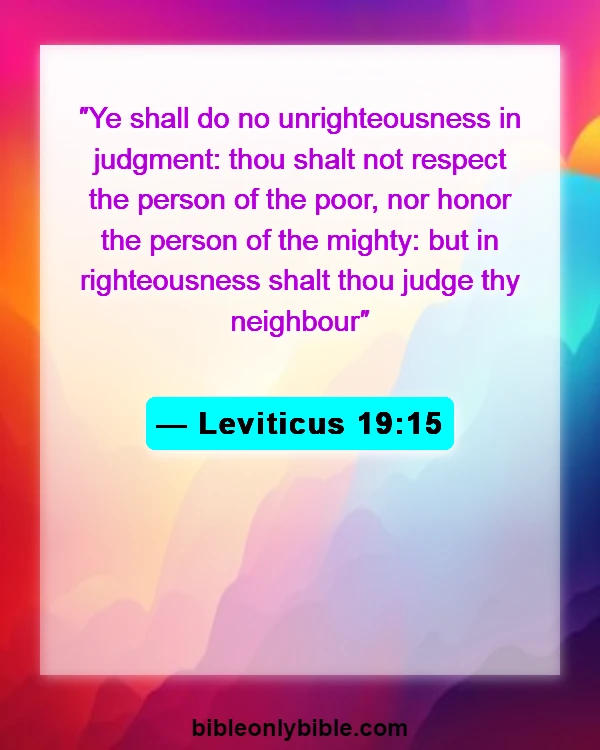
Ye shall do no unrighteousness in judgment: thou shalt not respect the person of the poor, nor honor the person of the mighty: but in righteousness shalt thou judge thy neighbour
Leviticus 19:15
Explanation:- This verse emphasizes the importance of impartiality in judgment, urging us to treat everyone with fairness regardless of their status. It underscores the biblical principle of justice, encouraging us to avoid favoritism and ensure equality in our interactions with others.
Proverbs 22:2 – Rich and poor are equal before the Lord

The rich poor meet together: the Lord is the maker of them all
Proverbs 22:2
Explanation:- This verse highlights that, regardless of wealth, everyone is equal in God’s eyes. It underscores the biblical principle of fairness and equality, reminding us to treat all individuals with respect and justice, as God values each person equally, irrespective of their social status.
James 2:8 – Love your neighbor as yourself, fulfill the royal law

If ye fulfil the royal law according to the scripture, Thou shalt love thy neighbour as thyself, ye do well
James 2:8
Explanation:- This verse highlights the importance of treating others with fairness and equality by following the principle of loving your neighbor as yourself. This “royal law” encourages us to act with compassion and justice, ensuring everyone is treated with respect and dignity.
Biblical Principles of Justice and Equal Treatment
God’s Word guides us to act justly in all our dealings. Justice isn’t just a concept; it’s a way of living that reflects God’s character. When we commit to equality and fairness, we honor God’s design for humanity. Each of us is called to be a beacon of justice, ensuring that everyone is treated with dignity and respect, reflecting God’s righteousness in our world.
Micah 6:8 – Act justly, love mercy, walk humbly with God

He hath shewed thee, O man, what is good; what doth the Lord require of thee, but to do justly, to love mercy, to walk humbly with thy God?
Micah 6:8
Explanation:- Micah 6:8 highlights core principles of justice, mercy, and humility as foundational to living a life aligned with God’s will. It calls for fair treatment of others, compassionate actions, and a humble walk with God, emphasizing the importance of fairness and equality in our daily lives.
Proverbs 21:15 – Justice brings joy to the righteous

It is joy to the just to do judgment: but destruction shall be to the workers of iniquity
Proverbs 21:15
Explanation:- Justice is a source of joy for those who live righteously, as it reflects God’s principles of fairness and equality. When justice prevails, it uplifts the righteous and aligns with the divine order, fostering a harmonious and equitable society.
Romans 2:11 – God shows no favoritism or partiality
For there is no respect of persons with God
Romans 2:11
Explanation:- This verse highlights that God’s justice is impartial, affirming that He treats everyone equally, regardless of status, race, or background. It underscores a foundational biblical principle: all are subject to God’s fair judgment, promoting fairness and equality among people.
Deuteronomy 16:20 – Pursue justice for fairness and righteous living
That which is altogether just shalt thou follow, that thou mayest live, inherit the land which the Lord thy God giveth thee
Deuteronomy 16:20
Explanation:- This verse underscores the importance of actively seeking justice to ensure fairness and righteousness in society. It calls for equitable treatment and decision-making, emphasizing that true justice leads to a harmonious and morally upright community.
Isaiah 1:17 – Seek justice, correct oppression, defend the vulnerable

Learn to do well; seek judgment, relieve the oppressed, judge the fatherless, plead for the widow
Isaiah 1:17
Explanation:- This verse calls for active engagement in promoting fairness and equality. It urges individuals to pursue justice, rectify injustices, and protect those who are vulnerable. This aligns with biblical principles of justice, emphasizing the importance of compassion and equal treatment for all.
Old Testament Verses on Fairness and Social Justice
The Old Testament lays a strong foundation for justice and fairness. These ancient teachings remind us that God’s concern for justice is timeless. We learn from these scriptures that fairness is not just about laws but about our hearts. By embracing these principles, we promote a society where love and justice prevail, echoing the heart of God throughout the ages.
Amos 5:24 – Justice and righteousness flow like a river
But let judgment run down as waters, righteousness as a mighty stream
Amos 5:24
Explanation:- Amos 5:24 calls for justice and righteousness to be abundant and continuous, like a flowing river. It emphasizes the importance of fairness and social justice, urging people to create a society where equity and moral integrity prevail, reflecting God’s desire for a just world.
Deuteronomy 10:18 – God defends orphans, widows, and loves foreigners
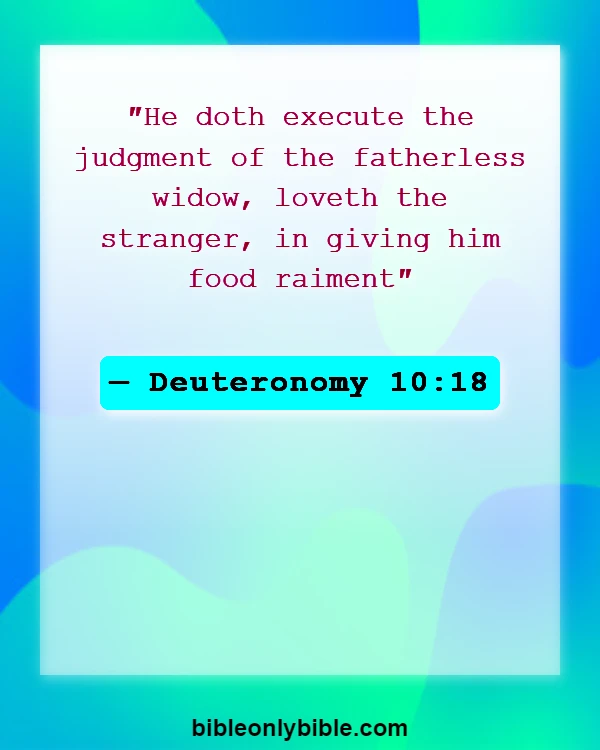
He doth execute the judgment of the fatherless widow, loveth the stranger, in giving him food raiment
Deuteronomy 10:18
Explanation:- This verse highlights God’s commitment to fairness and social justice by showing care for the most vulnerable in society, such as orphans, widows, and foreigners. It emphasizes God’s love and protection, encouraging us to act with compassion and fairness toward others.
Exodus 23:6 – Do not deny justice to the poor
Thou shalt not wrest the judgment of thy poor in his cause
Exodus 23:6
Explanation:- This verse underscores the importance of ensuring justice for the poor, emphasizing fairness and social justice in legal matters. It calls for integrity and impartiality, reminding us to protect the rights of the vulnerable and uphold righteousness in our communities.
Proverbs 31:9 – Speak up and judge fairly for justice
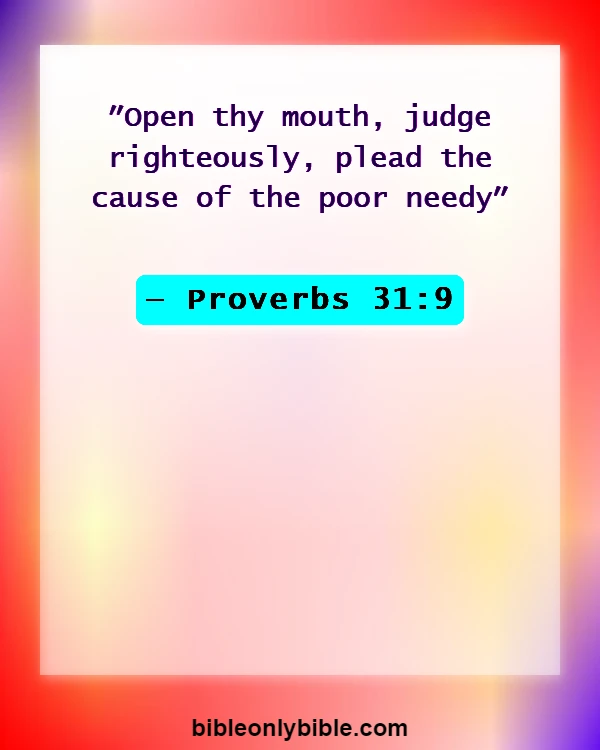
Open thy mouth, judge righteously, plead the cause of the poor needy
Proverbs 31:9
Explanation:- This verse encourages advocating for those without a voice and ensuring justice for the marginalized. It calls for fair judgment and active participation in promoting social justice, highlighting the importance of speaking up for those who cannot defend themselves.
New Testament Teachings on Equality and Impartiality
The New Testament builds on the theme of fairness, urging us to love our neighbors as ourselves and to practice impartiality. This teaching challenges us to break down barriers and embrace unity. As we strive to treat others equally, we mirror God’s impartial love, fostering a community where everyone is valued and included, just as God intended.
James 2:1 – Show no favoritism; practice faith with impartiality
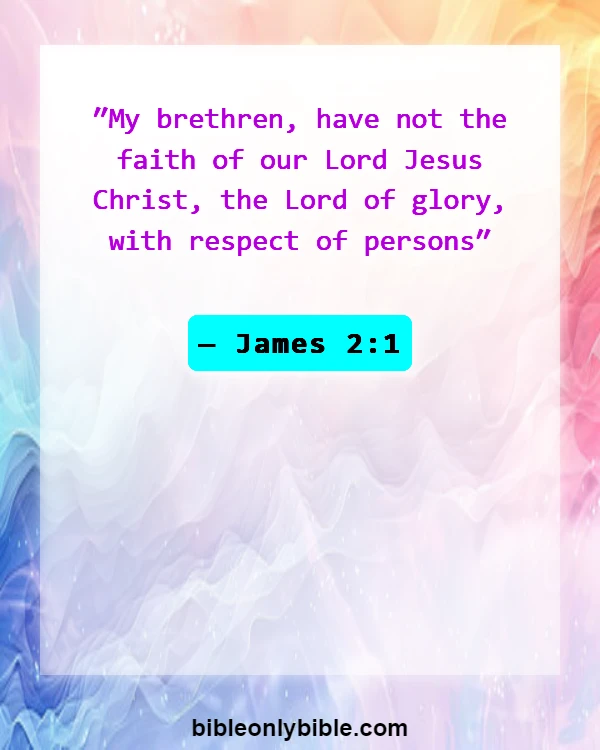
My brethren, have not the faith of our Lord Jesus Christ, the Lord of glory, with respect of persons
James 2:1
Explanation:- This verse highlights the call to practice faith without favoritism, emphasizing the importance of treating everyone equally. It urges believers to embody fairness and impartiality, reflecting the core Christian value that all individuals are valued equally in the eyes of God.
Galatians 3:28 – All are one in Christ Jesus
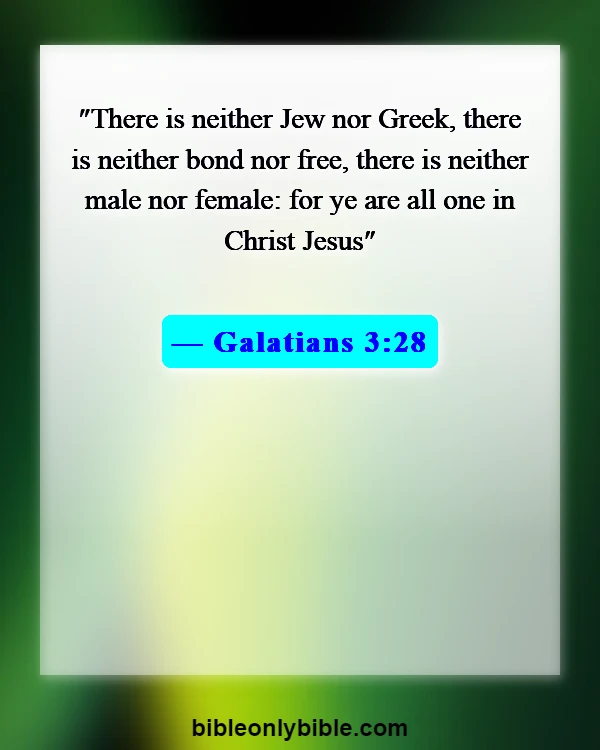
There is neither Jew nor Greek, there is neither bond nor free, there is neither male nor female: for ye are all one in Christ Jesus
Galatians 3:28
Explanation:- This verse highlights the fundamental Christian belief in equality and unity among believers, transcending distinctions such as ethnicity, social status, and gender. It underscores the idea that in Christ, all are equal and valued, promoting a message of fairness and impartiality.
Colossians 3:11 – Christ unites all, transcending divisions
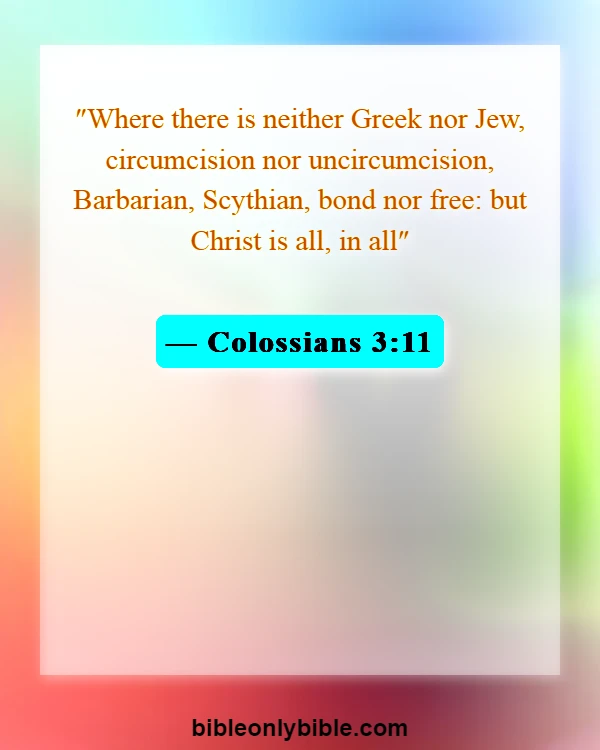
Where there is neither Greek nor Jew, circumcision nor uncircumcision, Barbarian, Scythian, bond nor free: but Christ is all, in all
Colossians 3:11
Explanation:- In this verse, Paul emphasizes that in Christ, all human distinctions, such as ethnicity, social status, or cultural background, are erased. Christ unites everyone, promoting equality and impartiality, reminding believers that their identity in Him transcends all divisions.
Acts 10:34-35 – God shows no favoritism, accepts the righteous everywhere
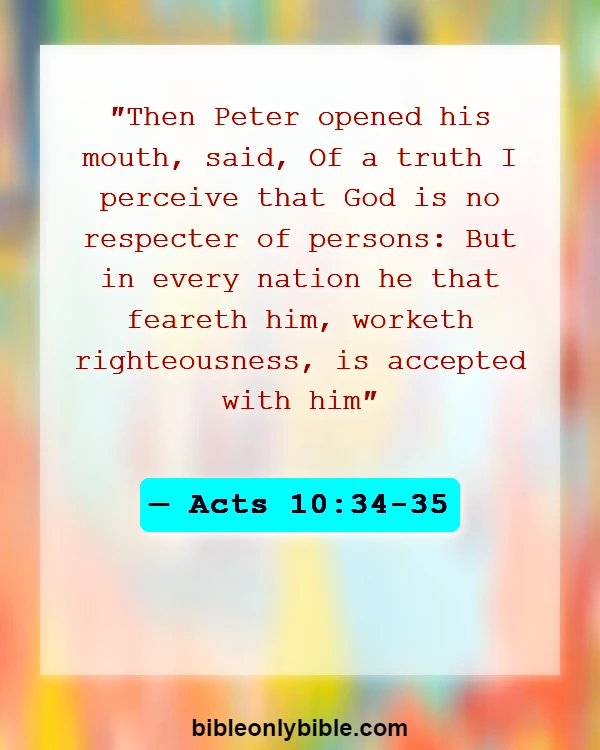
Then Peter opened his mouth, said, Of a truth I perceive that God is no respecter of personsBut in every nation he that feareth him, worketh righteousness, is accepted with him
Acts 10:34-35
Explanation:- This passage highlights that God is impartial and welcomes all who are righteous, regardless of their background or nationality. It underscores the New Testament’s message of equality, teaching that divine acceptance is based on righteousness and reverence, not on external distinctions.
1 Timothy 5:21 – Keep instructions without bias or partiality
I charge thee before God, the Lord Jesus Christ, the elect angels, that thou observe these things without preferring one before another, doing nothing by partiality
1 Timothy 5:21
Explanation:- This verse urges believers to uphold teachings with fairness, avoiding any bias or favoritism. It highlights the importance of impartiality in decision-making, reflecting the New Testament’s emphasis on equality and justice among all individuals, regardless of their status or background.
Matthew 7:12 – Treat others as you wish to be treated
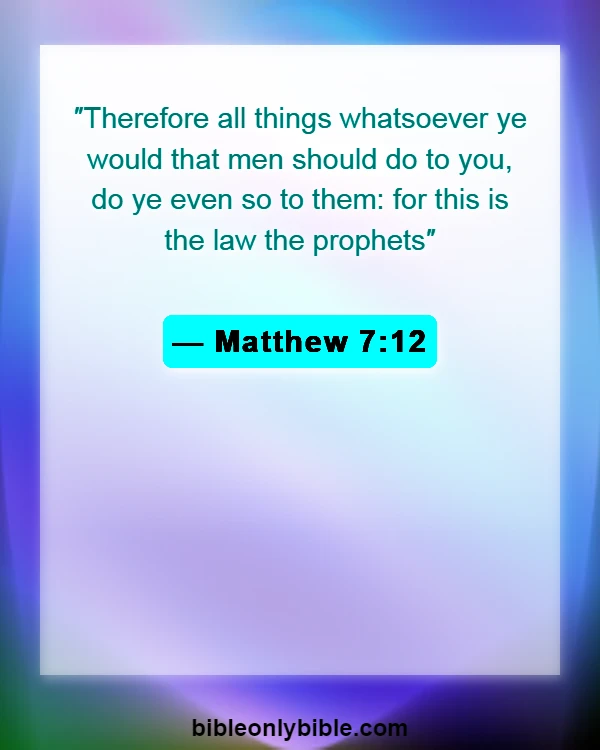
Therefore all things whatsoever ye would that men should do to you, do ye even so to them: for this is the law the prophets
Matthew 7:12
Explanation:- This verse emphasizes treating others with the same kindness and respect you desire, highlighting the core principles of fairness and equality. It encourages impartiality and mutual respect, reflecting the essence of New Testament teachings on how we should interact with one another.
How Jesus Demonstrated Fairness in His Ministry
Jesus exemplified fairness in His ministry, reaching out to the marginalized and teaching us to do the same. His interactions were marked by compassion and a deep sense of justice. By following Jesus’ example, we can learn to treat others with the same fairness and love, showing the world what it means to live out our faith in action.
Luke 6:31 – Treat others as you want to be treated

As ye would that men should do to you, do ye also to them likewise
Luke 6:31
Explanation:- In His ministry, Jesus exemplified fairness by teaching us to consider others’ needs and feelings as we would our own. This principle encourages empathy and equality, fostering a community where kindness and justice prevail. It challenges us to act with compassion and fairness in all interactions.
John 8:7 – Let the sinless cast the first stone

So when they continued asking him, he lifted up himself, said unto them, He that is without sin among you, let him first cast a stone at her
John 8:7
Explanation:- In this verse, Jesus highlights the importance of self-reflection and humility, urging us to consider our own imperfections before passing judgment on others. This teaches fairness and equality, as it calls for empathy and understanding in our interactions with others.
Matthew 20:16 – Many last will be first, first will be last
So the last shall be first, the first last: for many be called, but few chosen
Matthew 20:16
Explanation:- This verse highlights Jesus’ revolutionary teaching on fairness and equality, where societal hierarchies are overturned. In His ministry, Jesus often uplifted the marginalized, demonstrating that true greatness and divine justice prioritize humility and service over status, challenging conventional notions of fairness.
Mark 12:31 – Love your neighbor as yourself, embodying fairness
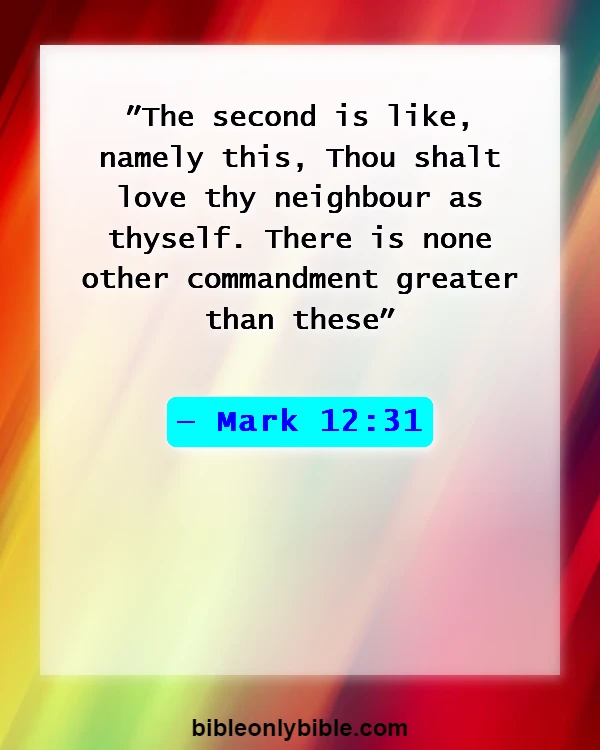
The second is like, namely this, Thou shalt love thy neighbour as thyself. There is none other commandment greater than these
Mark 12:31
Explanation:- This verse highlights the principle of treating others with the same love and respect we desire, embodying fairness and equality. Jesus demonstrated this through His inclusive ministry, showing compassion and justice to all, regardless of social status or background.
Bible Verses About God’s Perfect Justice
God’s justice is perfect and unwavering. The Bible assures us that God is fair in all His ways, and His judgments are righteous. Trusting in God’s justice gives us peace, knowing that He will right all wrongs. As we lean on His understanding, we find comfort in His promise that justice will ultimately prevail, giving us hope in a world that often seems unjust.
Psalm 9:7-8 – God’s eternal judgment ensures fairness and justice
But the Lord shall endure for ever: he hath prepared his throne for judgmentAnd he shall judge the world in righteousness, he shall minister judgment to the people in uprightness
Psalm 9:7-8
Explanation:- This passage highlights God’s eternal reign and just judgment. It assures believers that His decisions are fair and righteous, providing a foundation for true equality. God’s justice transcends human imperfection, offering hope for a world where fairness prevails.
Isaiah 30:18 – God’s justice brings blessings and grace

Therefore will the Lord wait, that he may be gracious unto you, therefore will he be exalted, that he may have mercy upon you: for the Lord is a God of judgment: blessed are all they that wait for him
Isaiah 30:18
Explanation:- This verse highlights God’s perfect justice, emphasizing His patience and desire to bless His people. It reassures us that God’s fairness brings grace and prosperity, encouraging us to trust in His timing and righteous judgment as He acts with both justice and mercy.
Romans 12:19 – Leave vengeance to God, He ensures justice

Dearly beloved, avenge not yourselves, but rather give place unto wrath: for it is written, Vengeance is mine; I will repay, saith the Lord
Romans 12:19
Explanation:- This verse highlights the importance of trusting God to enact justice. Instead of seeking personal revenge, believers are encouraged to leave retribution in God’s hands, as His justice is perfect and fair, ensuring that all wrongs are addressed according to His wisdom.
Psalm 37:28 – The Lord loves justice and protects the faithful

For the Lord loveth judgment, forsaketh not his saints; they are preserved for ever: but the seed of the wicked shall be cut off
Psalm 37:28
Explanation:- This verse highlights God’s unwavering love for justice and His commitment to protect those who remain faithful. It reassures believers that God’s perfect justice ensures fairness and equality, reinforcing that He stands by the righteous and opposes the wicked.
Hebrews 10:30 – The Lord will judge and repay justly

For we know him that hath said, Vengeance belongeth unto me, I will recompense, saith the Lord. again, The Lord shall judge his people
Hebrews 10:30
Explanation:- This verse reminds us that God’s justice is perfect and absolute; He will judge and repay with fairness. It reassures believers that ultimate justice lies in God’s hands, encouraging trust in His righteous judgment and discouraging personal vengeance.
Applying Biblical Fairness in Daily Life
Living out biblical fairness means making conscious choices to act justly each day. It’s about being honest in our dealings, showing kindness to strangers, and advocating for those without a voice. As we apply these principles in our daily lives, we not only grow closer to God but also help build a world that reflects His love and justice.
Luke 6:37 – Do not judge; practice forgiveness and mercy

Judge not, ye shall not be judged: condemn not, ye shall not be condemned: forgive, ye shall be forgiven
Luke 6:37
Explanation:- This verse calls for refraining from judgment and embracing forgiveness and mercy. By practicing these virtues, we promote fairness and equality in our daily interactions, fostering a compassionate and understanding environment that aligns with biblical teachings.
Proverbs 3:27 – Do good when able; don’t withhold from deserving

Withhold not good from them to whom it is due, when it is in the power of thine hand to do it
Proverbs 3:27
Explanation:- This verse encourages us to act justly and generously by helping others when we have the means. It underscores the importance of not withholding good from those who deserve it, promoting fairness and equality in our interactions and daily decisions.
Ephesians 4:32 – Be kind, compassionate, forgiving, as God through Christ

Be ye kind one to another, tenderhearted, forgiving one another, even as God for Christ’s sake hath forgiven you
Ephesians 4:32
Explanation:- Ephesians 4:32 encourages us to embody kindness, compassion, and forgiveness, reflecting God’s grace through Christ. By practicing these virtues, we promote fairness and equality in our interactions, treating others with the love and respect that God extends to us.
Galatians 6:9 – Persevere in doing good for future rewards

Let us not be weary in well doing: for in due season we shall reap, if we faint not
Galatians 6:9
Explanation:- Perseverance in doing good, even when faced with challenges, leads to future rewards. This encourages believers to remain steadfast in their efforts towards fairness and equality, trusting that their actions will ultimately bear fruit in due time.
Scriptures About Standing Up for the Oppressed
The Bible calls us to stand up for those who cannot stand for themselves. It challenges us to be advocates for justice and defenders of the oppressed. By following this call, we become instruments of God’s peace and love, working to bring about His kingdom on earth where justice and mercy reign. Let’s be courageous in our conviction to support those in need.
Proverbs 31:8-9 – Speak up for justice and defend the oppressed
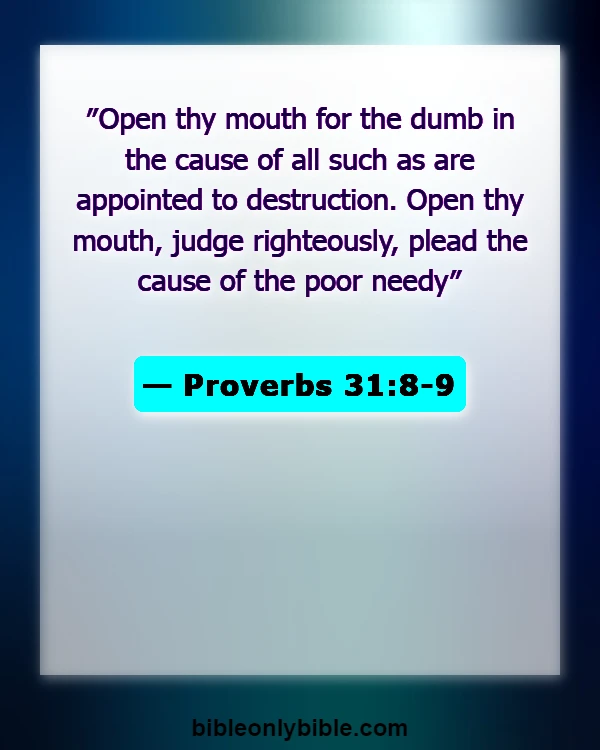
Open thy mouth for the dumb in the cause of all such as are appointed to destructionOpen thy mouth, judge righteously, plead the cause of the poor needy
Proverbs 31:8-9
Explanation:- This passage calls us to advocate for those who cannot speak for themselves. It urges us to defend the rights of the poor and needy, highlighting the importance of using our voices to promote justice and protect the oppressed, embodying fairness and equality.
Psalm 82:3 – Defend the weak and uphold the oppressed
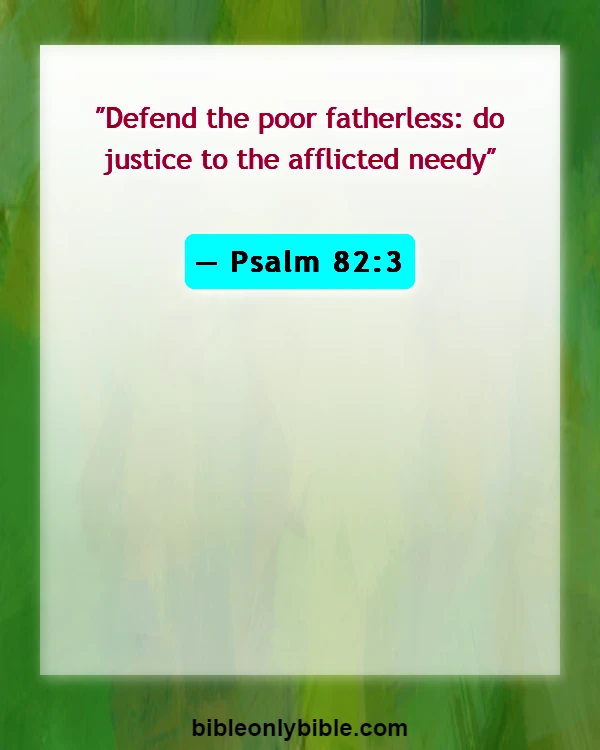
Defend the poor fatherless: do justice to the afflicted needy
Psalm 82:3
Explanation:- This verse calls for justice and compassion, urging us to protect those who are vulnerable and marginalized. It highlights the importance of standing up for the rights of the oppressed, promoting fairness and equality in society as a moral and spiritual duty.
Zechariah 7:9-10 – Act justly, show mercy, and care for the oppressed
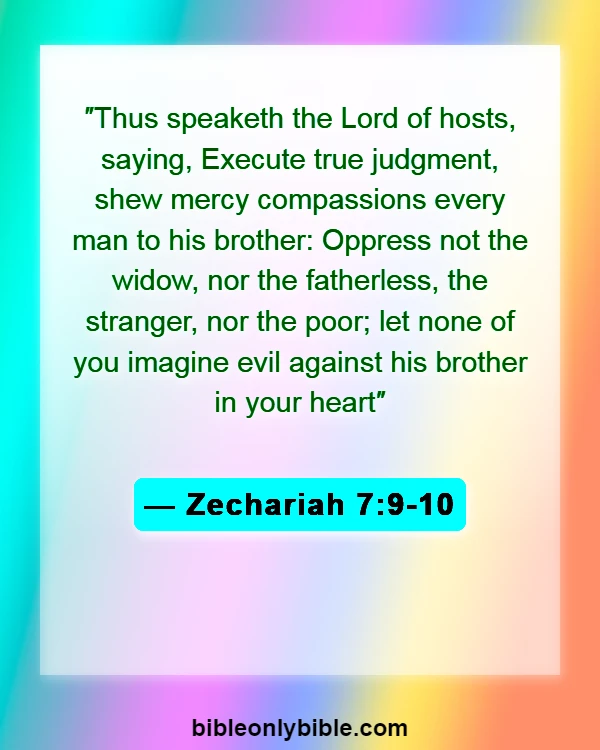
Thus speaketh the Lord of hosts, saying, Execute true judgment, shew mercy compassions every man to his brotherAnd oppress not the widow, nor the fatherless, the stranger, nor the poor; let none of you imagine evil against his brother in your heart
Zechariah 7:9-10
Explanation:- This passage emphasizes the importance of justice, mercy, and compassion. It calls on us to treat others fairly, showing kindness and care, especially towards the vulnerable and oppressed, reminding us of the fundamental principles of equality and moral responsibility in our communities.
Jeremiah 22:3 – Practice justice; defend the oppressed and vulnerable
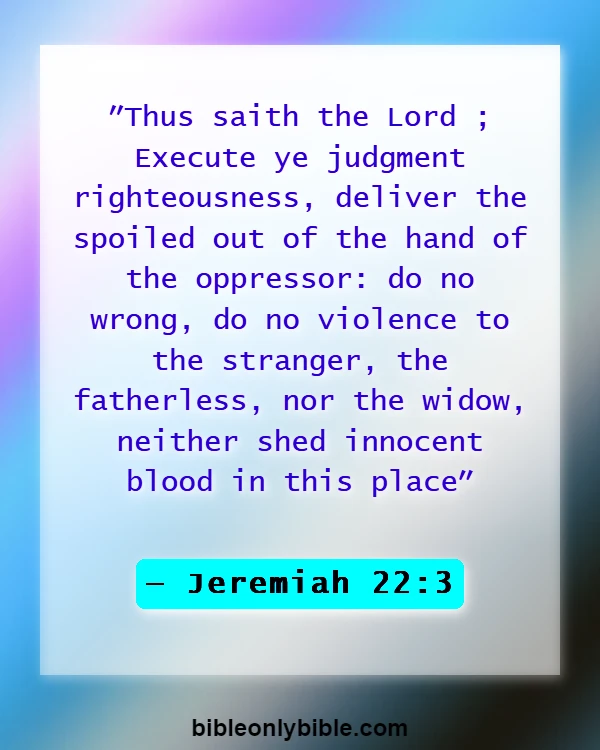
Thus saith the Lord ; Execute ye judgment righteousness, deliver the spoiled out of the hand of the oppressor: do no wrong, do no violence to the stranger, the fatherless, nor the widow, neither shed innocent blood in this place
Jeremiah 22:3
Explanation:- This verse calls for the practice of justice and the defense of those who are oppressed and vulnerable, urging us to act with fairness and compassion. It emphasizes the importance of standing up for the rights of others and addressing inequality with integrity.
Matthew 25:40 – Serving others is serving Christ

The King shall answer say unto them, Verily I say unto you, Inasmuch as ye have done it unto one of the least of these my brethren, ye have done it unto me
Matthew 25:40
Explanation:- This verse teaches that serving those in need is akin to serving Christ himself. It emphasizes the importance of compassion, fairness, and standing up for the oppressed. By caring for the marginalized, we demonstrate true discipleship and embody Christ’s love and justice.
